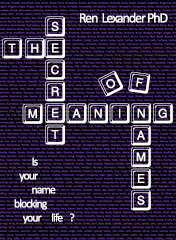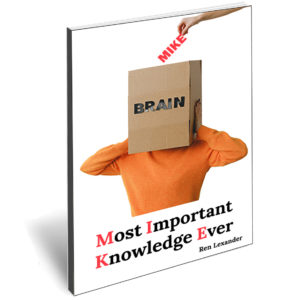The Secret Meaning of Names is a startling breakthrough in our understanding of how our names come from our parents’ subconscious and go on to shape our characters and lives.
Stemming initially from Dr Lexander’s own inner work and then backed up by ten years of research and work with hundreds of clients, The Secret Meaning of Names explains the theory and practice of ‘name-decoding’.
Few books can revolutionize your understanding of the factors that shape your life.
This one will.You will learn how to crack the hidden code contained in your name.
You will never look at your name or anyone else’s name in the same way again.
Not numerology. Not the archaic meaning of names.
Contains decodings for over 2,000 names.
Testimonials for The Secret Meaning of Names
Really terrific. I was very impressed. Very thorough. Very well researched and written in a way which is easily understood.
– Robin Stein, author of The Numbers of Love
I have read many “name” books… but none of them came close to describing the person… you described 100% their inner conflicts and direction and the essence of their life path.
– Ruby
A great tool for helping you to understand others. Thank you.
– Ben M. Smith
Ever since my son ‘seemingly’ named himself I have wondered why he chose his particular name – Now I know. This book answered a question long on my mind and in my heart.
Look up all your kids’ names and find out more about yourself – look up your own name and find out even more about your parents. Look up all your friends’ names and get to know them better.
Gain insight into the reason we have been given our name (or maybe why we gave ourselves our names) and maybe consider that that ‘feeling’ you’ve had for ages about changing your name, might be what you are meant to do – something like ‘re-inventing yourself’.
Learn how to de-code many other words as well – by their sound – all explained in THE SECRET MEANING OF NAMES.
Thank you Ren for a very informative and much needed book – not only a must for all those who would normally be interested in numerology and such…. but a must in everyone’s library.
– Helen Pohlman
A few weeks ago, I bought your book, The Secret Meaning of Names, after reading an article about it in the paper. I think it’s an excellent book and I totally agree with the idea. An excellent book and I totally agree with the idea. I’ve made some interesting revelations about names in my own family!
– Brook B.
Really interesting and insightful.
– Julie C.
Excellent book,
– C. Rizzo.
Extract from
The Secret Meaning of Names
Introduction: Humans are not roses
What’s in a name? that which we call a rose
By any other name would smell as sweet.
– Shakespeare, Romeo and Juliet.
Humans are not roses.
A rose knows not its name.
A rose does not have ears.
Unlike the rose, we are affected by sounds, by what is said to us, by what stirs around in our subconscious.
The name given to you by your parents can be one of the most significant factors determining your life and character.
Right now, your name may be one of your greatest assets, projecting out to others and the world what is best in you.
Or your name might be one of the key factors keeping you overweight, ill, mediocre, financially poor, emotionally immature or sexually unfulfilled.
A name is not a neutral label randomly attached to a baby which has no subsequent effect on the contents.
A name is more accurately viewed as being a condensed transmission from the subconscious of the parents.
This transmission contains coded messages about parental hopes, expectations and fears.
These messages are repeated countless thousands of times to the child – every time the name is said – and so can come to shape the child’s character and so their life.
Psychology tells us that everything people do, they do for a reason. Even apparently accidental slips of the tongue are not really ‘accidents’ but betray internal beliefs and desires. These are aptly known as ‘Freudian slips’.
If no action is an accident then certainly the parental selection of their baby’s name is no accident either.
Rather, the name is a reflection of the deep psychological make-up of the parents.
The parents who name their son ‘Julian Xavier Gregson-Smith’ have a different set of fears, hopes and beliefs to the parents who call their son ‘Wayne Norman Smith’. They have different expectations of the schools he’ll go to, his career, his social set, his hobbies, his looks, his sexuality, his personality and the number of opportunities open to him.
The one thing that does not significantly influence the parental choice of name is what the name meant many centuries ago.
Baby name books which purport to tell you the ‘meaning’ of a name are peripherally interesting but largely irrelevant to the parental decision on what to name the baby. All these baby-name books tell you is what the name used to mean. If the name actually still meant that, people wouldn’t need a book to tell them what it ‘means’. They wouldn’t need a baby name book to tell them that Katherine ‘means’ pure because they would know it.
If the archaic meaning was the determining factor in the choice of name, the parents would first think up the quality they wanted to give the child (in the right hand column) and then read across to the name that corresponded to that quality. They don’t. All they may do is check that a name which appeals to them does not have a negative archaic meaning. Sometimes parents will edit out a potential baby name on the basis of what it once meant centuries ago but even this is rare.
What actually happens is that parents select a name because it ‘sounds right’ for their child. The name ‘sounds’ like the sort of child they want to have.
But what is this mysterious quality of ‘sounding right’?
The central thesis of this book is that a name ‘sounds right’ to a parent because there are subconscious associations with other words in the language.
Parents who are worried about having a son who might stand up to them and defy them, call him ‘Neil’ because, subconsciously, they want him to ‘Kneel’ before their authority.
Parents who want a daughter who is caring and helps around the house call her Karen (Caring) and her sister is called Sharon (Sharing).
Parents who want their son to be happy all the time and make them happy call him Jeremy (Cheery-me).
The parents who never want to let go of their daughter call her Iona (I-own-her).
The parents who want a daughter who will look after them and take responsibility call her Kerry (Carry).
The parents who think it is more important than anything else that their daughter find herself a husband call her Marie (Marry).
The purpose of this book is lift the hidden veil on the programming effect of names.
This book can help you discover the subconscious parental thoughts behind your name and how that name has gone on to affect your life.
This book also represents an enormously useful tool for psychologists and others working in the field of personal growth. It can shed light on what may be major issues blocking a client’s life through an examination of the names of the client and their family.
How I became interested in names
My parents christened me Garry Ross Sargeant.
No, that isn’t the name you’ll find on the front of this book.
I first became interested in names in 1985 when writing the initial draft of my first novel, Eye of the Shadow. In it, the names of the characters play an important role in the plot. Selecting the names was an enormously tricky business. It made me very aware of how evocative a name can be.
If I say the name ‘Stan’, what sort of man do you think of?
Close your eyes and visualize a man named Stan.
Most readers will not think of a teenager. It is more likely that you will envisage a man over forty, probably with grey hair, solid build, if anything on the short side, a hard worker and a man not very interested in the arts nor very open to new ideas.
By contrast, the name ‘Julian’ is going to evoke a very different image in your mind. Generally, it will evoke an image of someone who is much younger, thinner, taller, from a wealthier background, ‘arty’ and probably has dark hair – and quite possibly long hair.
The name ‘Skye’ will evoke a different character image to the name ‘Mavis’. You will have very different mental images of these women’s background, age, weight, looks and personality.
In my creative writing, I became more circumspect and skilled at selecting names that evoked the type of character I wanted to portray. At that stage I hadn’t taken this insight to its logical conclusion: if names are so evocative of a character in fiction, then aren’t they also evocative of people in real life?
When a parent is naming a child, aren’t they in the same boat as a fictional writer: making up a name to describe an (as yet) non-existent person? Don’t parents then select the name that evokes the sort of child they want/expect to have?
Over the next five years, I developed a deep interest in experiential psychology and inner evolution and, as part of working on myself, I did a three-week live-in training in emotional transformation through breathwork.
One-third of the people on the course changed or modified their name in some way.
Much to my surprise, during an early session in the course, I heard myself shouting, ‘I’m not Garry. I’m not. No, I won’t carry the Sargeant family. I’m not born to carry the Sargeant family. I’m not going to Garry it. I’m not Garry.’
I heard myself making the startling insight that I had been named ‘Garry Sargeant’ because I was the one who was going to ‘carry’ the Sargeant family. My elder brother had been born with very significant disabilities. As the second and obviously last child, they looked to me to be the one who would take responsibility for everyone. They named me ‘Garry’ because I was to be the one who would carry the family.
And I had been. At the very moment of that insight, I had a mother with rapidly deteriorating Alzheimer’s, a father who had recently had a massive stroke and was totally paralyzed down the right side of his body and my only sibling was epileptic and spastic.
Other participants in that course started to make spontaneous insights into why they were given their names. ‘My father called me Alona – A loner – because he was frightened of the effect other children would have on me. And I realized I have been alone all my life.’ This woman changed her name to Stephanie.
A ‘Heather’ shared with me her realization that she was not truly a wanted child and so her parents called her ‘Hate-her’.
‘Clair’ (named after St Clair) had been so-named because her mother thought, ‘This one’s for God’. She went on to become a nun for fifteen years.
Adrian (A-drain) changed his name to ‘Adey’ (Aid-y).
And so it went on, people having the clear insight that the parental selection of name had not been accidental but contained parental fears and expectations that had gone on to deeply affect their lives.
These people supported me in letting go of my childhood name. I decided to let go of the name ‘Garry’ as part of letting go of carrying the Sargeant family.
Some people may object here: why shouldn’t you carry the family – that’s what sons are for – to carry their family.
This is a good opportunity to distinguish between doing things from programming and doing things from the space of free will. I continued to be supportive of my family – given the parlous state they were in, I didn’t have a real choice. However, I let go of the feeling that they were my responsibility. Instead, I supported them in taking as much responsibility for their own lives as they could for as long as they could.
It may be a fine thing to carry other people. But ultimately, it is a finer thing to support people in supporting themselves.
So I let go of the name ‘Garry’. At that stage, I had no idea how to develop a new name. I received the name ‘Ren’ via a meditation. Up until then, I had never heard it used as a name. After the course, I was able to look it up in a baby-name book. The nearest thing I could find to it was René which originally meant ‘reborn’. It seemed appropriate.
I had also received some advice about not being so ‘regimented’ in my life. This certainly struck a chord with me. I had been a regimented ‘Sargeant’: sticking to my routines as if they had been laid out by a commander, not trusting myself to be relaxed and spontaneous in when I did things. I decided that it was no longer appropriate to have the regimented ‘Sargeant’ part of me running the whole show.
It proved more difficult to find a new surname. Eventually I realized that I had always liked the name ‘Alexander’. I would probably now be called ‘Ren Alexander’ except that my father’s name was ‘Alan’ and I didn’t want my father’s name embedded in mine so I deleted the ‘Al’ part. Hence, Ren Lexander. ‘Lexander’ has an association with Alexander the Great, the leader of an army. So I had gone from being a ‘sergeant’ to being someone who leads.
Since those early days, I have gone on to discover other things about the name ‘Ren’. In Japan, it means ‘lotus blossom’, the symbol of enlightenment. In the Egyptian cartouche, ‘Ren’ refers to your secret or real name. In computer-speak ‘REN’ is shorthand for the renaming of a file.
Many of these associations seem appropriate for someone writing a book which, among other things, can help the reader understand the secret meaning of their name.
Table of Contents
Introduction: Humans are not roses
How I became interested in names
Part I: The Theory of Name-Decoding
Introduction to Part One: The power of sounds
Chapter One: How people are programmed by their names
How parents select names
- ‘It just sounded right
- ‘We named them after so-and-so’
Programming from the parents’ point of view
- Parental fears
- Parental hopes
- Parental beliefs
- The parents’ current emotional state
Programming from the child’s point of view
One man’s meat
Beliefs: the self-fulfilling prophecy
Positive acting and ‘rebelling’
Names and the compulsion to recreate childhood hurts.
Chapter Two: First Names
The messy adventure of language
First steps in decoding a name
Who originally suggested the name?
When were they given that name?
Were they named after someone else?
What was the condition of the Baby?
What was the condition of previous children?
Adopted children
Chapter Three: Middle Names
Run-on names
Deviant numbers of middle names
Middle names and the subconscious
The initials
William: a living name dinosaur
Chapter Four: Other Given Names
Near names
Pet names
Scold names
Teasing names and other nicknames
Confirmation names
Chapter Five: Surnames
Types of surnames
1. Surnames from patronymics
2. Surnames from nicknames
3. Surnames from occupations
4. Surnames from place names
Double-barrel surnames
Surnames other than English
Surnames and career choice
Surnames and character
The relationship between given names and the surname
Run-on names
Major Major names
Minor Major names
Major Minor names
Some famous examples
Decoding of self-created names
Decoding of fictional names
Names and dreams
Stupid first and surname associations
Part II: The Practice of Name-Decoding
Introduction to Part Two
Chapter Six: Bonding Patterns
Important note re bonding indicators
Missing parent syndrome
Sibling bonding
Bonding patterns in other languages
Ten examples of classic bonding patterns
Chapter Seven: Given Names and Family Patterns
Common patterns in naming children
Other common patterns
A detailed example of name-decoding
Chapter Eight: Decoding Your Own Name
History of your name
The sound of the name
The reverse acronym
Matching up your name to key negative programming beliefs
Your life with a different name
Step One: Develop an antonym name
Step Two: Rewrite your life.
Chapter Nine: How Has Your Name Worked For You?
So do I change my name or what?
What do YOU say after YOU say hello?
Part III: Categories of Names
Junior Names
Family-strings Names
Own-her Names and Own-him Names
Ma Names, Pa Names and Da Names
Carry Names
Nurture Names
Virginity-protecting Names
Get-married Names and Be-a-mother Names
Flower Names
Precious Names
Be-cheerful Names
Cheer-us-up Names
Save-the-marriage Names
Quality Names
Compensatory Names
Athletic Names
Mother’s Mood Names
Birth Trauma Names
Sickness Names
Marred Names
Death and Die Names
Live Names
Low-energy Names
Gender-bender Names
Be-macho Names
Don’t-stand-up-to-us Names
Eat-up Names
Leen Names
Less Names
Loss Names
Financial Orientation Names
Barbie Doll Names and Ken Doll Names
Ette Names
Elle Names and Belle Names
Sexual Attraction Names
Be-exotic Names and Nationality Names
Be-an-Englishman Names and Be-an-Englishwoman Names
Unusually Spelt Names
Double-barrel Names
Nursery-rhyme Names
Royalty Names
Famous-figures Associations
Biblical Names
Ah Names
This-one’s-for-God Names
Christ Names
Witch Names
Ashram Names
Cut-out Names
Career Names
Body Part Names
Sphincter Names.
Appendices
Appendix One: The concept of babies naming themselves.
Appendix Two: Decoding Words Other Than Names
Part IV: Name-Decodings
Index











